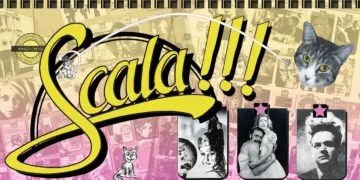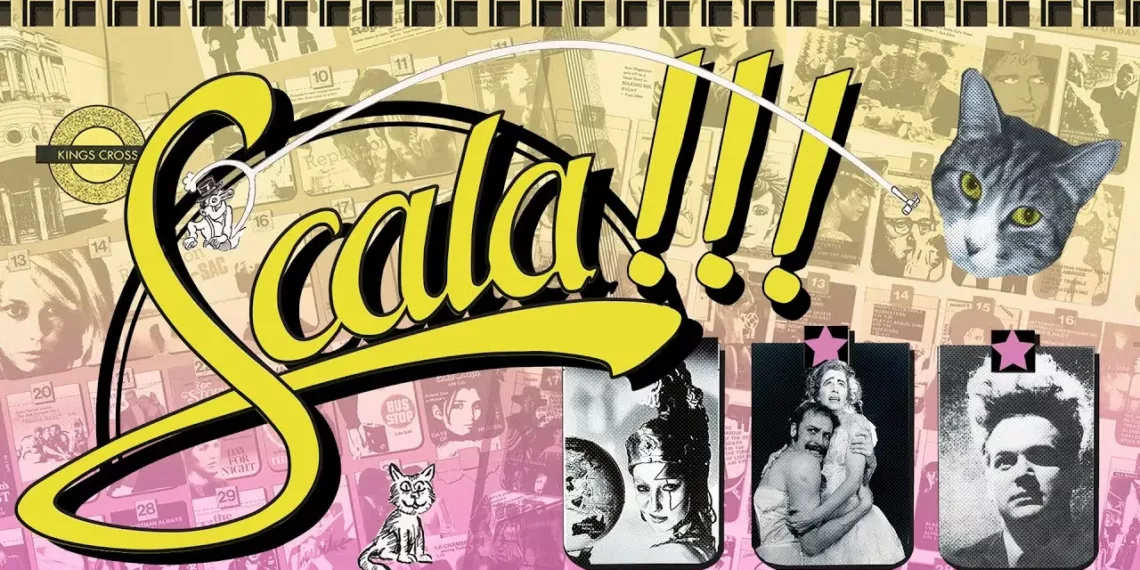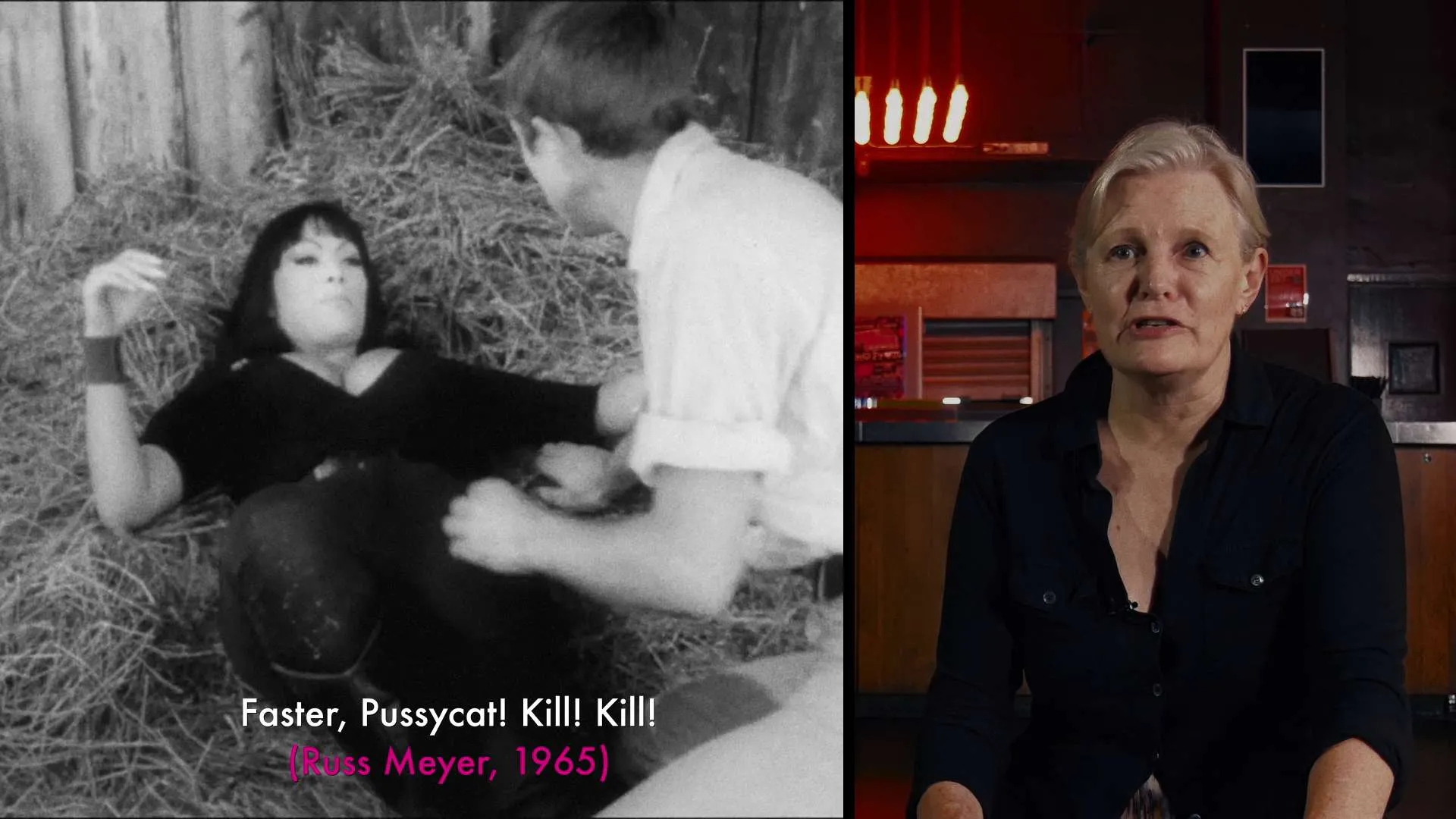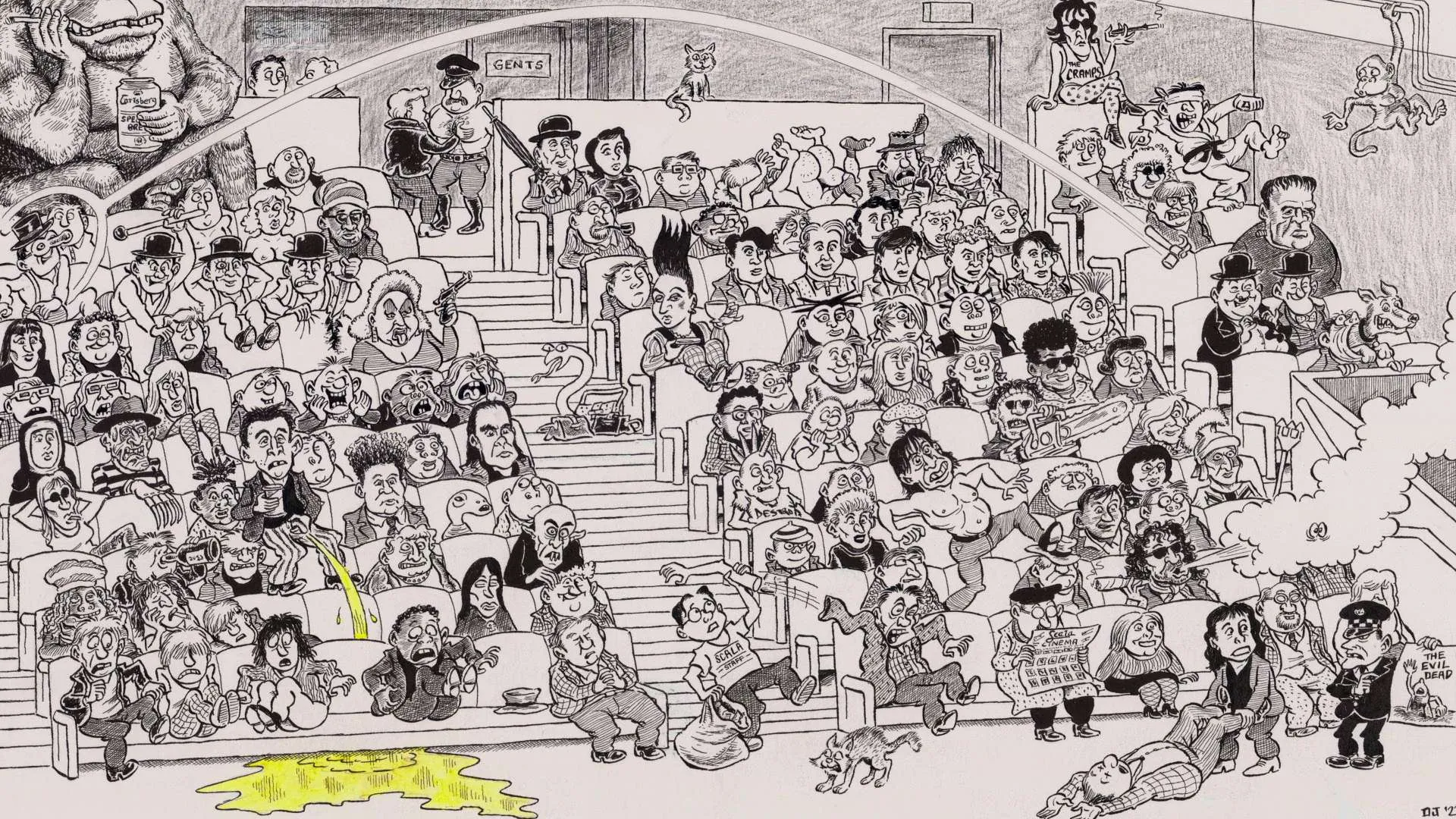London’s Scala Theater has loomed large in legend for those who remember its heyday. Operating from 1978 to 1993, it carved a unique space showing cult films far removed from the mainstream. Audiences flocked there to immerse in the strange, freewheeling spirit the Scala embodied. Directors Jane Giles and Ali Catterall bring this theatrical landmark vibrantly back to life through Scala!!!.
Their documentary immerses viewers in the Scala’s grimy atmosphere, rekindling nostalgia for its outrageous screenings and loyal community. Today, cinema culture continues evolving rapidly, and independent theaters face challenges to survive. But Scala!!! assures the Scala’s rebellious spirit of discovery lives on through those who keep its memory alive.
The Scala forged a home for cinema devotees seeking experiences beyond Hollywood. Housed in a crumbling King’s Cross building, it screened everything from midnight movies to uncensored genres. Programmer Jane Giles welcomed diverse patrons, making the Scala an underground bastion.
Scala!!! transports audiences inside its flickering walls through interviews and clips. We hear tales of scandalous audience antics and the Scala’s role in championing progressive causes. Famed directors like John Waters praised its anarchic spirit, and many British film artists credit the Scala with fueling their passion.
While Scala!!! looks back nostalgically, its celebration retains relevance. Independent theaters that fostered communities face pressures to conform or close. But the Scala story shows cinema’s power to spark imaginations and bring misfits together. Its rebellious programming opened minds and careers at a turbulent time.
And Scala!!! reminds us that meaningful movie experiences can emerge from humble settings, outside multiplex conformity. Its exuberant tribute proves some places are too revered to ever really disappear, as long as their renegade rhythms live on in memories and spin their magic on screens.
Revelations of the Ragged Screen
The Scala offered a wildly diverse mix of movies far beyond what other theaters showed. Audiences could spend an entire night exploring thought-provoking art films alongside cult favorites, exploring genres normally confined to late night television. The Scala willingly pushed boundaries, crafting a safe haven where all were welcome to immerse in progressive stories and underground treasures.
While other cinemas presented refined lineups settled in advance, the Scala embraced unpredictability. Jane Giles and staff proudly curated whatever caught their curiosity. Horror rubbed shoulders with nudity and social satires. Visitors could discover filmmakers now celebrated, then unknown. The Scala welcomed adventurous souls seeking experiences beyond Hollywood.
An anything-goes approach defined the Scala. But this rebellious spirit was more than shocking for shock’s sake. The Scala stood with marginalized groups and laborers, projecting voices silenced elsewhere. Its programmers understood moods and messages resonating with patrons, cultivating a community respecting all.
Nighttime marathons brought this spirited assembly to life. Commentators evoke the Scala’s vibe—a safe place for societal outsiders uniting in appreciation. Nostalgic recollections suggest screening experiences enhanced by the very decrepitude separating minds from daily realities.
Perhaps what truly united Scala patrons was a hunger to explore the unseen riches of cinema and to forge bonds with like-hearted travelers. For many in that age of budding fandom, places like the Scala were principal guides into recesses of a then unwieldy art form. It kindled flames that later sparked waves of cult hitmakers, ensuring the renegade rhythms of its ragged walls echo on.
Tales from the Scrappy Screen
Scala!!! features a memorable cast of characters who breathed life into the theater. Filmmakers, comics, programmers—all return to the Scala now fixed in nostalgia. And what tales they weave! Wild recollections pour forth of jaw-dropping shows and riotous crowds.
We hear from folk like Adam Buxton, recalling Madcap movie marathons fueling rowdy patrons. Comedians like Stewart Lee share the Scala’s allure, an edgy escape drawing outsiders with a sense of humor. Even across the pond, cult icon John Waters pays tribute, likening the Scala to a haven for “criminals and lunatics.”
Whether detailing an audience member’s unexpected sleep or a prosthetic’s wind up in places best left unsaid, reminiscences entertain with sly grins rather than shock. Because really, for diehard Scala-goers, these hijinks were just routine revelries!
In speaking with Scala’s tribe, one joins a room where cinematic treasures spark fond debates. Programmers like Jane Giles ensured misfits found community, and through her we live those nights anew, from flickering shadows to closing calls.
While memories resurrect an unruly past, tones stay affable, even nostalgic. Respect shines through for a symbol bigger than seedy walls—a theater that transformed lives. Perhaps that’s why, decades on, the Scala maintains status as a beacon where all belonged, if only for a night.
Revelations in Raw Cinema
Scala!!! captures the Scala’s anarchic spirit through its visceral visuals. Just like the theater’s scrappy posters whipped fans into a frenzy, the documentary pulls viewers straight into the grit and glee.
We’re plunged into the Scala universe through a collage of artifacts—promotional zines, crumbling photos, flickering clips. Like rummaging amid memorabilia of a favorite band, these fragments tease nostalgia while reflecting the Scala’s DIY charisma.
Directors Giles and Catterall seamlessly splice interviews between reels depicting unforgettable screenings. We live the movies alongside patrons, swept up in shared thrills. The Scala surges to life not through pristine reconstruction but vigorous evocation like its late-night experiences.
Unconfined to chronology, Scala!!! channels the Scala’s unpredictable pulse. Interludes between recollections ignite intrigue versus tidy exposition. We follow tangents as easily as scalates veering between genres each night.
In form mirroring content, this rowdy tribute feels truer to its rebel roots than clinical retelling. Scala!!! welcomes us not as observers but participants in its cultish spirit of discovery on-screen and off. The end remains unwritten for the renegade reel that keeps on inspiring.
The Scala Effect: Cultivating Cult Cinema
The Scala played a profound role in Britain’s cult cinema boom. Its festivals and genre events birthed a bounty of movie fan clubs and gatherings. Audiences flocked to geek out and spread passion for their favorite flicks.
It was here viewers first encountered films now deemed classics. But back then, programming like Eraserhead and Pink Flamingos exposed patrons to bizarre visions beyond the multiplex. The adventurous atmosphere equipped Scala-goers to recognize brilliance in far-out forms.
Directors celebrate discovering their craft at the Scala. Ben Wheatley recalls how its manic mixes provoked imagination. For Peter Strickland, the Scala sparked fascination with oddball cinematography. Their careers reflect how the theater schooled fans in the artistic potential of taboo topics and obscure styles.
This review rightfully calls the Scala a “film school without classes.” Beyond the movies, Scala attendees absorbed the renegade spirit necessary to cultivate cult followings. They gained confidence presenting quirky personal projects, knowing their rickety theater nurtured Nilby, the avant-gardist.
While the Scala shuttered, its rebellious programming endured. Cult movies and underground British cinema exploded in the decades following. The eclectic passions of its devotees helped previously unconventional works like Pink Flamingos find passionate audiences.
The Scala may have closed long ago. But memories of its maniacal mixes and encouragement of outsider artistry continue inspiring new generations to present strangeness with pride. Its cultish conventions persist, spawning cults, proving this theater’s cultivating influence lives on.
The End of Reel Rebellion
By the early 90s, pressures grew, which the Scala’s spirit could no longer resist. Rising rents and steady declines in patronage strained its situation. But the final blow came from an unexpected foe.
When Scala defied Warner Bros. by screening the banned A Clockwork Orange, it sparked a legal battle, which proved the eventual financial ruin. With this, Scala’s anarchic reign reached its end, or so it seemed.
In truth, Scala’s shutdown signaled wider losses as repertory houses fell victim to multiplex homogenization. Treasured cinemas where adventurous audiences congregated started disappearing. Something invaluable was being lost—a type of theatrical experience that could never be copied.
Or so it seemed, until Scala!!! arose to resurrect nostalgia. The documentary pays tribute by passionately recalling Scala’s remarkable run. It recognizes a theater that was so much more than walls—a spirit that altered the artistic paths of many.
While Scala’s physical screen now lays silent, its legacy echoes on in independent cinema and cult fandom. And through Scala!!!’s loving requiem, the theater finds renewed significance. A new generation gains insight into Scala’s role in cultivating their favorite genre pioneers.
Most importantly, Scala!!!’s popularity proves The Scala’s rebellious rhythm refuses to cease beating. Though shuttered, its heart pulses on wherever fans congregate to champion the unconventional, proving some institutions are too beloved to ever really die.
Revelations of the Ragged Screen Revisited
This review has taken viewers on a voyage into the captivating world of London’s Scala Theater. We’ve relived its eclectic movie offerings and rowdy late shows. Memories from spirited staff and patrons breathed vibrant life into the Scala’s hallowed halls.
Along the way, Scala!!!’s impact emerged clear. Through archival artifacts and recollections seamlessly interwoven, the film spirited us straight to the Scala long after its original exit. We joined the devoted gathering not just to observe but to share their communal passion for cinematic renegades of every stripe.
In capturing the Scala’s anarchic soul so irrepressibly, Scala!!! ensures this singular cinema’s rebellious rhythms live on, inspiring future generations as it did those who first passed through its flickering doors. The Scala may have long since shed its skin. But as a tribute to its fervent fan culture and the artistic spirits it championed, Scala!!! becomes an essential piece of nostalgic cinema in its own right.
It leaves the final frame with fond memories but also fresh eyes to appreciate the risqué, genre-bending prospects unlocked for so many in that unforgettable setting. Some institutions outlive mere structures to eternalize in spirit. The Scala stands as one cherished forever through the wild-hearted visions of its ramshackle reels.
The Review
Scala!!!
Scala!!! delivers a raucous, heartfelt tribute to London's legendary Scala Theater in a style befitting its anarchic subject. Transporting viewers straight into the cinema's late-night screenings through archival clips and vivid recollections, the film breathes new life into the Scala's renegade spirit. While nostalgia runs thick in its celebration of the venue's ramshackle revelries, Scala!!! earns its exclamation points by reigniting appreciation for the artistic pioneers cultivating within its molting walls. More than ahistorical homage, the documentary ensures the unconventional energies of this singular venue live on to energize cinema's next wave of cultish creatives.
PROS
- Authentic capturing of the Scala's anarchic atmosphere through interviews and archival footage
- Pays fittingly energetic tribute to the theater's passionate fan culture and groundbreaking programming.
- Transports viewers vividly into the experience of attending the Scala's legendary late-night screenings.
- Celebrates the Scala's profound influence on cult and independent British cinema
CONS
- Nostalgia is laid on very thick, which risks exaggerated portrayal.
- Era discussed is fairly niche in appeal for those not already fans of cult cinema.





















































